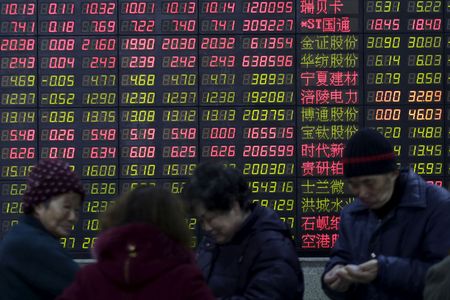By Scott Murdoch
SYDNEY (Reuters) – Asian equity capital markets activity, languishing at three-year lows now, is set to get a much needed boost in 2023 from China’s expected re-opening to the rest of the world after a spate of COVID-19 lockdowns, dealmakers said.
An easing of China’s two-year tech sector crackdown, coupled with a breakthrough for the U.S. audit watchdog to get access to financial accounts of mainland firms, is also seen as a positive for equity capital markets activity, encompassing initial public offerings (IPOs), secondary listings and follow-on equity sales.
“As China’s re-opening happens, market activity will come in stages,” said Edward Byun, Goldman Sachs’ co-head of equity capital markets in Asia ex-Japan, adding that secondary market trading and follow-on capital raisings would benefit first.
“As confidence on the recovery builds, we will begin to see the conditions emerge for a resumption of the IPO market.”
IPOs in Asia Pacific, including Japan, fell by 43.3% this year in value terms, while total equity capital market deals plunged 52%, according to Refinitiv data.
Hong Kong was the most affected market in the region as IPOs, once a staple of Asia’s financial hub and a major fee earner for the city’s banks, dropped to the lowest level in 10 years.
China’s gradual re-opening should also prompt global investors to again start putting money in the world’s second largest economy, after two years of allocating funds away from it.
‘ELEPHANT IN THE ROOM’
“Many international investors moved money back to the U.S. but China is still the elephant in the room, you can’t ignore it,” said Harish Raman, Citigroup’s head of equity syndicate for Asia Pacific.
“If you feel that the U.S. has really peaked and valuations are getting out hand and you want to take some profit, where are you going to deploy that, it has to come back to China.”
New share sales in Hong Kong plunged 74% to $7.4 billion this year from $28.17 billion in 2021, Refinitiv data showed. Of the 70 IPOs in the city this year, 44 are trading below their offer price, according to separate data from Dealogic.
But the city was not the only major market to suffer.
Nasdaq IPOs fell 95% this year as investors grappled with the Russia-Ukraine war, higher energy costs, and spiralling inflation that has pushed interest rates to record levels globally.
In Australia, fundraising via IPOs fell to $633.1 million this year from $9.6 billion in 2021 but Australian equities outperformed with only a small drop.
“My expectation is that we do get some IPO activity in the first half of 2023, and provided we do get that and the benefit of a more stable market and calm economic backdrop, we will get a lot more activity in the second half,” said Matthew Beggs, UBS’s co-head of equity capital markets for Australasia.
In India, IPOs were down nearly 60% to $7.13 billion from $17.05 billion, the Refinitiv data showed.
U.S.-CHINA AUDIT CLEARANCE
Domestic Chinese deals, however, rose with the value of Shanghai’s STAR Market IPOs climbing 11.4% as companies still awaiting final regulations to carry out international share sales were forced to raise money locally.
China’s Securities Regulatory Commission (CSRC) released draft guidelines last year for Chinese companies keen to list offshore but it has yet to announce final rules.
Separately, about 200 mainland companies averted delisting risks in New York after the U.S. accounting watchdog got full access to inspect and investigate firms in China for the first time.
The regulatory hassles meant only five Chinese companies completed U.S. IPOs this year, raising a combined $162.5 million, according to Refinitiv data, down from $12.8 billion last year.
“Given the latest developments (on the audit access), we will hopefully see the window reopen for U.S. offerings over the course of 2023,” said Goldman Sachs’ Byun.
(Reporting by Scott Murdoch in Sydney; Editing by Anshuman Daga and Muralikumar Anantharaman)

